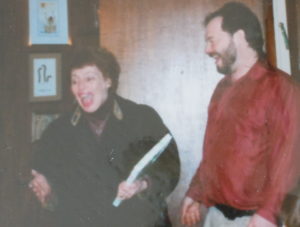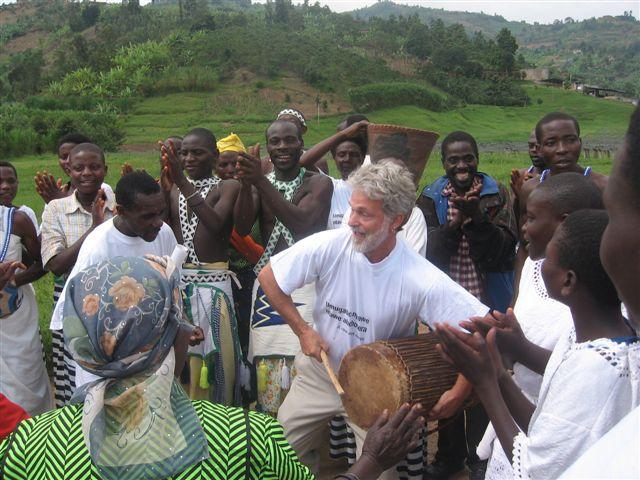10 People Who Changed My Life
There are hundreds more I could honor. These 10 are all people I knew personally. I chose them somewhat randomly, basically who came top of mind first. I am grateful to all of them even if the interaction was painful when it happened.
- My mom, whose commitment to racial justice extended to desegregating the apartment building we lived in. She was also a tester for the Urban League, making sure that when a black family was told an apartment was already rented that it was really rented—by applying to live there.

Walking my mother, Gloria Yoshida, into her 65th-birthday surprise party, 1998 - The speaker I heard when I 12, at my first peace demonstration, who told me the Vietnam war was undeclared—and brought my false reality crashing down around me.
- The idiot who made me sit in the children’s section of a movie theater with my full-price adult ticket (also age 12) and gave me my first experience of discrimination-based injustice (for being part of a class of people). I started a boycott of that cinema that has now continued for 48 years, and thus had the first experience of recognizing that I had power to change things.
- Mrs. Ehrlich of the Bronx High School of Science English Department in the 1970s, who believed the lie I’d told that I had turned in an assignment. Horrified, she said she’d never lost a student paper before. I felt intense guilt and realized that my action had hurt someone innocent. I’ve done my best not to repeat that and to take responsibility for my actions even when I don’t like the consequences.
- My first grade teacher, Mrs. Gross of Westchester Day School in the 1960s, who recognized that I was already a good reader and sat me in the back of the room with a 4th grade geography text while she inflicted Sally-Dick-and-Jane on the rest of the class. I still love reading, still love maps, and that was probably the first time I recognized how fascinating the world is, how people lived so differently in different parts of it.
- The college classmate who yelled at me that I was extremely and consistently selfish. It hurt like hell at the time, but on reflection, I realized he was right. And I changed my behavior! (Years later, I went up to him at a reunion and thanked him. He didn’t even remember the incident.)
- Dr. Jeffrey Lant, who was the first person to help me discover you-centered, benefit-focused marketing.
- Dean Cycon, CEO of Dean’s Beans, who combined the strongest moral compass and the best sense of humor of any business owner I know. (I never got to meet the late Ray Anderson; he might have topped Dean in his commitment).
- Maggie Kuhn, founder of the Gray Panthers, who started a whole social movement after mandatory retirement forced her out of a quiet job within the Presbyterian Church.
- Pete Seeger, who was probably the first to show me that the arts could change people’s minds and create action for social and environmental justice.

